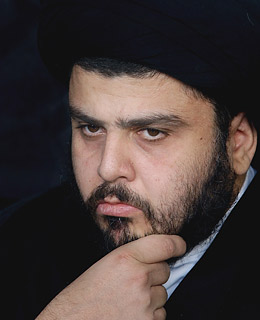
During 2003, U.S.-led coalition forces considered Muqtada al-Sadr a renegade Shi'ite leader whose legitimacy was based mostly on the anti-Saddam Hussein legacies of his father and uncle. Although his Mahdi Army was small and loosely organized, he was able to quickly mobilize tens of thousands of Shi'ites from Baghdad to Basra.
In April 2004, al-Sadr's militia attacked coalition forces and took control of most provincial capitals in southern Iraq. In response, President Bush officially declared al-Sadr the enemy and ordered the military to capture or kill him. "We can't allow one man to change the course of the country," stated Bush in a video teleconference. "He must be wiped out." However, within a week, the White House reversed direction and ordered coalition forces to walk away from the mission. Negative media coverage was endangering the planned July 1, 2004, transfer of sovereignty to Iraq, which was heavily tied to Bush's re-election campaign.
That reversal was the turning point in al-Sadr's rise to power. It gave him legitimacy and enhanced his stature within the broader Iraqi community. The White House handed off this problem to the new Iraqi government with the clear understanding that he would not be arrested but, rather, made a part of the political process.
As a fierce opponent of what he calls "the American occupation," al-Sadr, 34, appeals to the poor Shi'ite masses and thereby controls the stability of southern Iraq. By turning up the level of violence at will, he is able to control the coalition war-fighting environment, disrupt Iraq's political progress and affect American public opinion. Today, as Iraq moves toward provincial elections, he is in a position to alter world events. He will inevitably continue as a major political power broker on the Iraq scene. But the die was cast in April 2004.
Lieut. General Sanchez commanded coalition forces in Iraq from June '03 to June '04